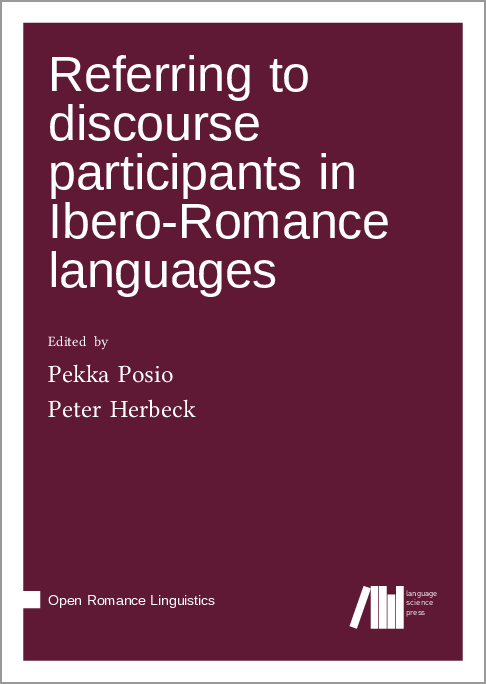We log anonymous usage statistics. Please read the privacy information for details.
Referring to discourse participants in Ibero-Romance languages
Synopsis
This volume brings together contributions by researchers focusing on personal pronouns in Ibero-Romance languages, going beyond the well-established variable of expressed vs. non-expressed subjects. While factors such as agreement morphology, topic shift and contrast or emphasis have been argued to account for variable subject expression, several corpus studies on Ibero-Romance languages have shown that the expression of subject pronouns goes beyond these traditionally established factors and is also subject to considerable dialectal variation. One of the factors affecting choice and expression of personal pronouns or other referential devices is whether the construction is used personally or impersonally. The use and emergence of new impersonal constructions, eventually also new (im)personal pronouns, as well as the variation found in the expression of human impersonality in different Ibero-Romance language varieties is another interesting research area that has gained ground in the recent years. In addition to variable subject expression, similar methods and theoretical approaches have been applied to study the expression of objects. Finally, the reference to the addressee(s) using different address pronouns and other address forms is an important field of study that is closely connected to the variable expression of pronouns. The present book sheds light on all these aspects of reference to discourse participants. The volume contains contributions with a strong empirical background and various methods and both written and spoken corpus data from Ibero-Romance languages. The focus on discourse participants highlights the special properties of first and second person referents and the factors affecting them that are often different from the anaphoric third person. The chapters are organized into three thematic sections: (i) Variable expression of subjects and objects, (ii) Between personal and impersonal, and (iii) Reference to the addressee.
Chapters
-
Referring to discourse participants in Ibero-Romance languagesIntroduction
-
Part IVariable expression of subjects and objects
-
A cross-dialectic comparison of first person singular subject pronoun expression in Southern Arizona and Southeast Texas
-
Variable indirect object pronoun expressionA usage-based analysis of Galician and Spanish
-
Variable subject expression in second language acquisitionThe role of perseveration in acquisition
-
Part IIBetween personal and impersonal
-
Portuguese a pessoa and uma pessoaEmerging inclusive impersonals
-
Personal uses of impersonalizing strategiesHybrid constructions with a gente and se in rural Madeiran Portuguese varieties
-
On pronominal uses of geral in Brazilian Portuguese
-
Toward the prevalence of a personal use of impersonal uno in Colombian Spanish
-
Discourse participants in impersonal constructionsThe case of first and second person object pronouns with Spanish non-anaphoric third person plural subjects
-
Part IIIReferring to the addressee
-
Referring to discourse participants in European PortugueseThe form of address o senhor
-
Variation and change in reference to discourse participantsin Catalan parliamentary debate (1932–1938 and 1980–2020)
Reviews
-
Review in "Romanische Forschungen" Band 137 (2025), Heft 2
by Iker Zulaica Hernández,
published January 9, 2026
[...] Las aproximaciones teóricas son diversas y la práctica totalidad de tesis presentadas se apoyan en datos empíricos provenientes de corpus de diferente naturaleza. El resultado es un monográfico riguroso, de gran calidad científica, y profundidad en el análisis de los temas abordados que nos ofrece un excelente panorama sobre el estado de la investigación actual sobre referencia a los participantes del discurso. [...]




